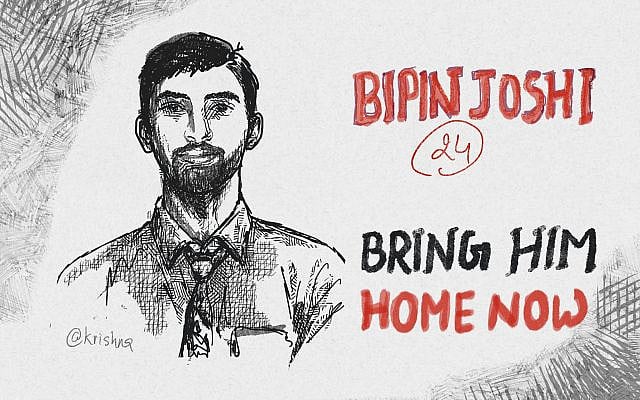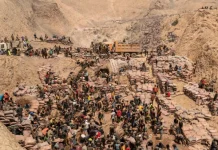While his family begs for his return from Gaza, many Nepalis wonder if greater diplomatic pressure could have freed him
The heart knows no greater anguish than the uncertainty of a loved one’s fate. For nearly two years, a mother and a sister have lived suspended in this agonizing limbo, their tears tracing a path across oceans, from Nepal to the distant land of Israel. They are Padma and Pushpa Joshi, and their desperate quest is for Bipin Joshi, a son, a brother, a Nepali citizen, tragically caught in a war not his own.
October 7, 2023. This date is etched not just into the Joshi family’s soul but into the collective memory of Nepal itself as a black day. Bipin, like many ambitious young people, had journeyed to Israel for an agricultural training and internship program, dreaming of a brighter future. He had been there barely a month when the unthinkable struck. On that fateful day, Hamas militants launched their brutal assault. Of the seventeen Nepali students doing an agriculture internship, ten were cruelly murdered. Amidst this horrific violence, our friend Bipin Joshi vanished, taken hostage by Hamas.
The scenes from that day are deeply heart-wrenching. Trapped in a shelter at Kibbutz Alumim, terrified Nepali students, unable to distinguish between Hebrew and Arabic and knowing little beyond English, pleaded desperately, “Please don’t kill us, we are Nepali students!” Their cries went unheard.
Ten lives were extinguished, and Bipin Joshi was abducted, becoming a name on an agonizing list of the disappeared.
His last clear sign of life was video footage from November of that same year, showing him being taken to Gaza’s Shifa Hospital. Since then, silence, an impenetrable veil of uncertainty, has descended upon his fate. No one knows if he is alive or what his condition might be.
Now, Padma and Pushpa have journeyed across the “seven seas” to Israel, their voices raw with grief and hope, making heart-rending pleas for Bipin’s release. They are a constant, tearful presence at programs organized by the Hostages and Missing Families Forum, advocating tirelessly for his release. The Nepali community in Israel and Nepal, too, has rallied, held demonstrations, and exerted pressure relentlessly. The mother and sister have met with Israeli officials, including President Isaac Herzog, Prime Minister Benjamin Netanyahu, Foreign Minister Gideon Sa’ar, and the Speaker of the Knesset Amir Ohana, and even the US ambassador to Israel, Mike Huckabee, begging for help with tear-filled eyes: “Please help us release Bipin Joshi, no matter what.”
Pushpa Joshi’s emotional appeal on foreign soil, standing on public platforms, asking for her brother’s life, has resonated deeply, not just with Nepalis but has moved the world. At Tel Aviv’s Hostages Square, her tearful cry, “Brother… I miss you so much,” was a poignant echo of personal sorrow that also revealed a nation’s pain. President Herzog, after meeting with Padma and Pushpa, pinned Bipin’s picture to his chest, offering a glimmer of hope. They are also pushing for international pressure for Bipin’s release through the United Nations. Bipin’s mother and sister traveled to Israel from Nepal, stayed for ten long days, and returned to Nepal with nothing but tears in their eyes. Everywhere they went, they folded their hands, they begged, they cried out: “Please, return our innocent Bipin Joshi to us.”
Yet, despite these desperate appeals and earnest efforts, the reality remains stark. Many Nepalis feel that the lack of concrete diplomatic initiative might be why Bipin’s condition remains unknown. However, sources suggest that the situation is complex, as Hamas’s criteria for releasing hostages are unknown. Nepal’s government has been continuously engaging in diplomatic initiatives with countries close to Hamas, such as Qatar, Egypt, and Turkey, to open dialogue. They are also increasing pressure on Hamas through organizations like the United Nations and the International Red Cross. Days have turned into months, and months into years. Nearly two years later, the results remain “nil.”
The Nepali community in Israel is small, and sources note a perceived lack of the strategic and aggressive diplomatic initiative that should have been undertaken for the release of the only Nepali citizen held hostage. Nepal’s reliance solely on its bilateral ties with Israel is deemed insufficient, as Israel itself is at war with Hamas. Bipin’s return is not just a family’s hope; it is a national expectation for Nepal. This tragic incident has also served as a stark lesson for Nepal, highlighting the need for robust policies to protect its citizens in international crises, especially given that over 6,000 Nepalis work in Israel.
Even as despair looms after nearly two years, a flicker of hope remains. The enduring prayer is that one day, this war will end, and Bipin Joshi – a Nepali student, a friend, a brother, a son – will return home safely. Until then, the tears of a mother and a sister continue to fall, and Nepal collectively holds its breath, waiting, hoping, praying for Bipin’s safe return.
BY:Krishna Paksha Thapa, an independent writer and storyteller.








